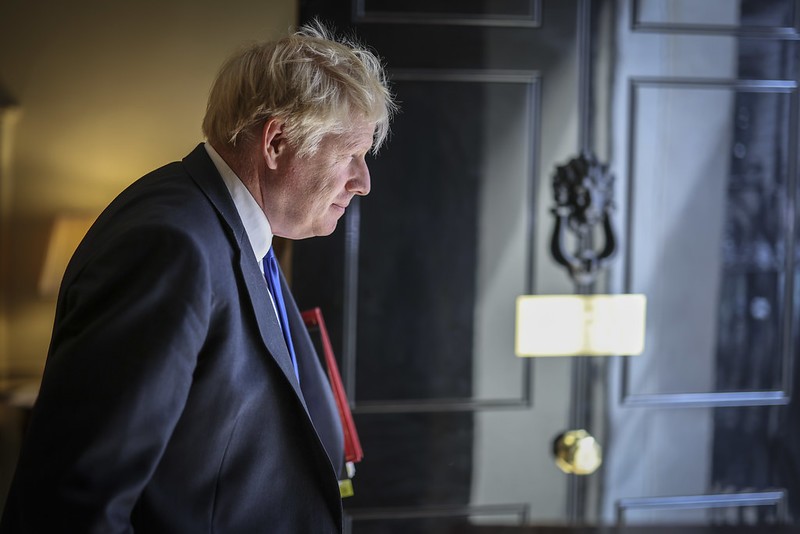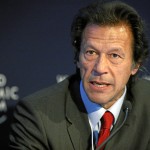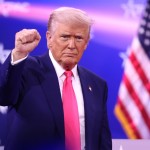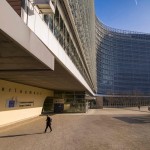The officials contacted the monarch in July 2020 after the then-Prime Minister, Boris Johnson, allegedly ignored the advice of the House of Lords Appointments Commission (HOLAC) which had highlighted “significant potential risks in respect of the nominee’s familial links,” according to a Channel 4 documentary broadcast on Tuesday.
Evgeny Lebedev’s father, Alexander Lebedev, 63, is a former KGB intelligence officer who was stationed in London during the 1980s and 1990s. He later became a billionaire businessman and acquired British newspaper The Evening Standard, which Evgeny, 43, helped run.
HOLAC’s chairman allegedly wrote to the Prime Minister on July 23, 2020 after Britain’s security services “red-flagged” Evgeny Lebedev’s nomination by Johnson to the House of Lords, according to the documentary. Yet Ledebev was inaugurated into parliament’s upper chamber in December 2020.
Lord David Clark, a Labour Party peer who was a HOLAC member at the time, told the film’s makers that Johnson overruled the commission’s advice, which he said was “probably unheard of in modern times” and demonstrated a “dangerous” disregard for the constitution.
And Lord George Foulkes, a former member of parliament’s intelligence and security committee, said he knew of “no other example where the prime minister has overruled intelligence advice on the grounds of national security.”
The U.K. monarch is constitutionally entitled to intervene in an appointment to parliament’s upper chamber, but the Queen reportedly declined the request, which Buckingham Palace feared would draw her into political controversy, the documentary claims.
“All individuals nominated for a peerage … are vetted by the House of Lords Appointments Commission,” a representative of Boris Johnson said. “Mr Johnson remains fully supportive of Lord Lebedev’s appointment and as the government has repeatedly confirmed the normal process was followed … Mr Johnson did not ‘overrule HOLAC’ or ignore security advice.”
A spokesperson for Evgeny Lebedev told Channel 4 that the Lord was “familiar with the security advice and understands no such attempt was made by the security services to persuade the [Prime Minister] to withdraw the nomination. As for his father, he has made clear that he has no links to, nor does he support, the Putin regime.”
Alexander Lebedev did not respond to emailed questions sent to his company.
Johnson has been a personal acquaintance of Evgeny Lebedev for several years, according to the documentary which shows footage of the two men sleeping on London’s streets in 2015 to raise awareness of homelessness.
In April 2018, Johnson, then the U.K.’s foreign secretary, attended a social gathering at Alexander Lebedev’s villa in Umbria where he was allegedly monitored by Italian intelligence as part of an investigation into whether the property had been used for spying purposes, the documentary claims.
In 2021, a letter which Italy’s foreign intelligence agency wrote to the country’s then-Prime Minister, Giuseppe Conte, and was shown to the Italian parliament’s Intelligence Oversight Committee, said that Alexander Lebedev “enjoyed the favor and friendship of Vladimir Putin”. The letter also said the billionaire newspaper owner continued to attend KGB meetings in Moscow after formally leaving the spy agency.
“Any suggestion that Lord Lebedev was or would be party to allowing any form of espionage, whether connected to Russia or anyone else, would be false and libelous,” a spokesperson for Evgeny Lebdev said.
Lia Quartapelle, an Italian MP and vice president of a parliamentary committee on foreign affairs, told the film’s makers that the properties were part of “a network of relationships… [and] a strategy of influence.”
Last year, Johnson told a U.K. parliamentary committee that he had met Alexander Lebedev at the April 2018 social event while unaccompanied by officials, adding that “no government business was discussed.”
Johnson traveled to the Umbrian gathering directly from a NATO summit in Brussels after EU leaders agreed it was “highly likely” that Russia was responsible for the previous month’s nerve agent attacks in Salisbury, U.K., which targeted Russian double agent Sergei Skripal.
A spokesperson for Johnson told Channel 4 that the former prime minister did not travel to Italy without Foreign Office knowledge.
But Lord Simon McDonald, who was Permanent Under-Secretary at the U.K.’s Foreign and Commonwealth Office and Head of the Diplomatic Service at the time, told Channel 4 that he did not know in 2018 that Johnson intended to go to Italy to see the Lebedevs right after the summit.
Chris Steele, a former MI6 intelligence officer, told the film’s makers that he was “flabbergasted that a serving government minister would even consider spending a weekend in Italy in the castle that was owned by a former KGB officer.”
In 2014, weeks after Russia’s invasion of Crimea, Alexander Lebedev corresponded directly with senior figures in Vladimir Putin’s administration about the disputed peninsula, emails obtained by OCCRP and shown in the documentary reveal.
On March 5, 2014, Lebedev emailed a letter to Sergei Ivanov, chief of staff of the presidential administration, proposing to organize group vacations to Crimean resorts for employees of Russia’s Ministry of Defence, Ministry of Internal Affairs, and other state companies, one email shows. In the letter, Lebedev had warned of “catastrophic consequences for the peninsula’s economy” due to the events in Crimea.
Days later, the Russian billionaire sent a letter to Vladislav Surkov, a presidential assistant considered to be the Kremlin’s chief ideologist, offering to host a peace conference in a historical Crimean theater whose restoration he had financed, another email shows.
Last year, after Russia’s full-scale invasion of Ukraine, Canada added Alexander Lebedev to a list of sanctioned “elites and close associates of the regime” who have “directly enabled Vladimir Putin’s senseless war in Ukraine and bear responsibility for the pain and suffering of the people of Ukraine.”
Lebedev has not been sanctioned by the U.K., U.S. or EU, but was sanctioned by Ukraine last October, it emerged earlier this month.
‘Boris, The Lord And The Russian Spy’, was produced for Channel 4 by True North Productions. OCCRP and IrpiMedia contributed research.



